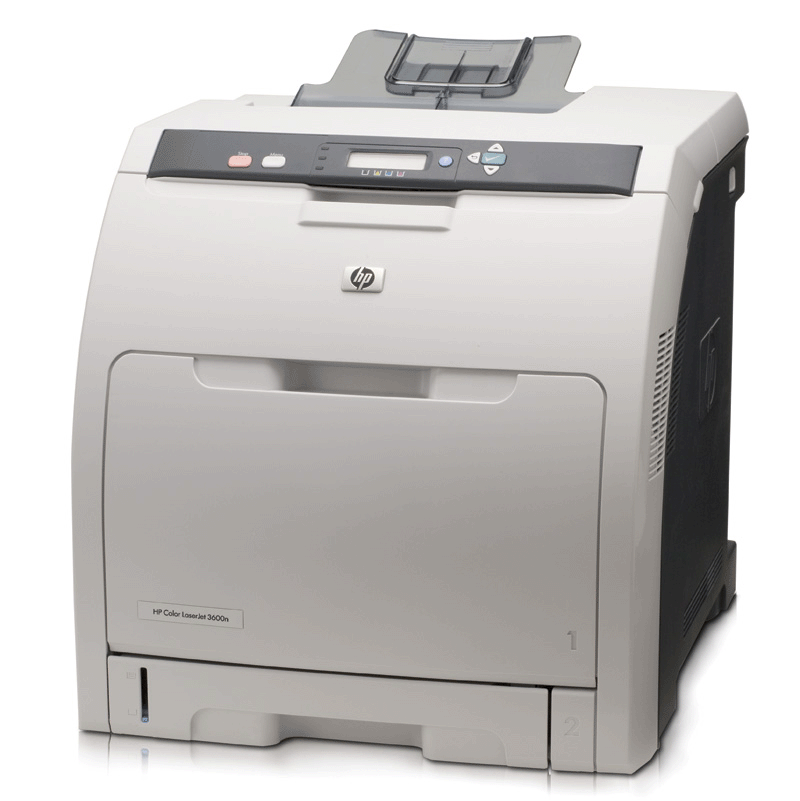All About the HP Colour LaserJet 3600n

Design
With a price tag of £480, the new HP Colour LaserJet 3600n is small, weighs 27kg and has deep handholds, so one person can carry it easily. At 15.7 by 15.7 by 17.7 inches (HWD), this laser printer can easily fit into a busy home office or individual office in a large company, should you need this level of speed and paper capacity. Its simplistic design makes jam-clearing and maintenance uncomplicated. However, the wall and hinges don’t appear to be too sturdy. It can be setup in the standard manner applicable to its class of printers, and the network installation routine is fully automated.
Paper Handling
The HP Colour LaserJet 3600n offers high-speed performance, with an engine rated at 17 pages per minute (ppm) for both colour and monochrome, fairly good graphics quality, even better text, and photographs that are good enough for client newsletters and the like. HP has also included an Ethernet connection for easy sharing over a network.
However, the main paper tray feels a little unsteady and has nothing to stop it when pulled out, so users should be careful not to drop it. The paper-length and paper-width guides are easy to adjust. The printer has a 100-sheet auxiliary feed in addition to the enclosed 250-sheet tray. You can boost this number to 850 by adding a 500-sheet feeder for £280.
Features
A two-line backlit LCD screen on the 3600n’s top panel displays a complete set of menus, which is easy to navigate with buttons for going through menus, selecting items and going back.
This printer comes with 64MB of memory and unfortunately you cannot expand that, nor add a duplexer, which makes expansion options very limited. If you need the extra memory, then consider HP’s 3600dn, a £670 model with a duplexer and twice the memory.
Performance
The 3600n prints black text at a reasonable 13ppm and colour graphics a bit faster, at 13.5ppm. In contrast, the Lexmark C522n prints text at 14.2ppm and graphics at 12.3ppm. However, if saving money is your real priority, and you don’t print much colour, consider Ricoh Aficio G700, which prints fine text at 12.1ppm but misses the cut on graphics speed and quality.
The 3600n disappoints the user with its print quality. In a few tests carried out by popular technology magazines, the text looked greyish instead of black, showed some roughness in large point sizes, and lost fine strokes. This is also the case with some of the 4-point output, which looked slightly grey, rather than black. Colour graphics did not negotiate shading ramps smoothly and produced blockish transitions. However, the printer makes the cut with colour accuracy and detail. Additionally, it prints greyscale photos very well, with fine detail and smooth shading.
Graphics are easily good enough for internal business use, but not satisfactory for handing out to important clients or customers. The most important issue in a number of tests was misregistration, with the colours slightly out of alignment. It resulted in a noticeable white gap between some blocks of colours, around some lines, and around some colour text on a colour background. Thin lines also tended to disappear. Additionally, colours tend to shift toward darker shades, losing detail in dark areas and making some colours look muddy.
On the whole, the 3600n’s text output has high enough quality for most purposes. Unless you have an unusual need for small font sizes, it is unlikely that you will print any text that the 3600n can’t handle. Lexmark’s similar C522 sells for around £100 less and offers equal speed and better quality, though Lexmark’s cost per page is slightly higher than HP’s and the difference may add up over time.
